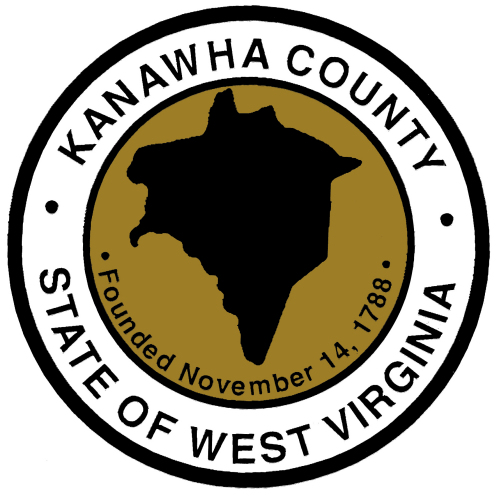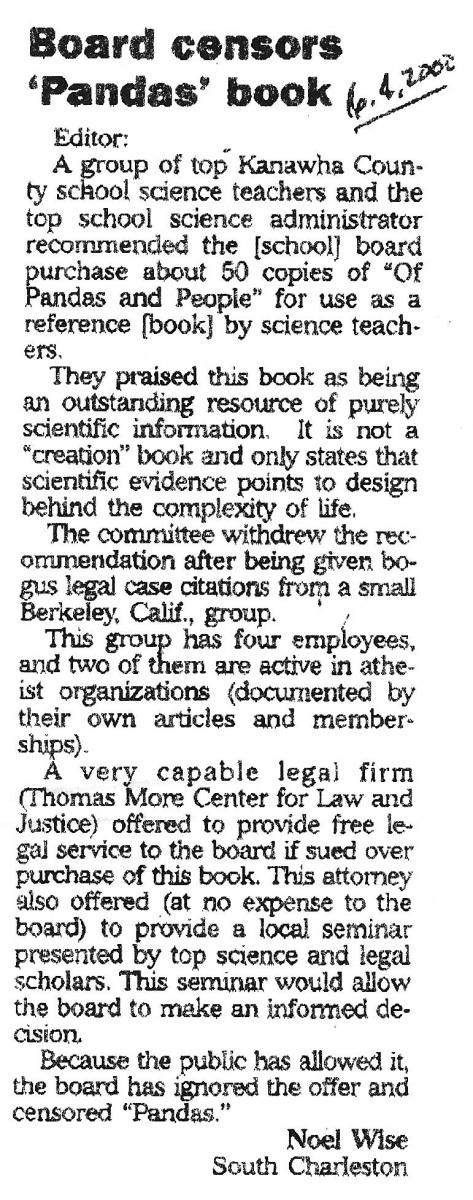
I’ve been volunteering in the NCSE archives since I retired, and it’s been a lot of fun rummaging through old files. I came across one this week that brought me up short, because its contents suggested the possibility that the 2005 “intelligent design” trial, Kitzmiller v. Dover, could have played out five years earlier, in West Virginia.
The file contained miscellaneous clippings and correspondence about the Thomas More Law Center in Ann Arbor, Michigan. Of particular interest was a letter to the editor of the Charleston Gazette, dated June 4, 2000, which had been forwarded (with some glee) by a staff member of the ACLU of West Virginia to NCSE’s Molleen Matsumura. Reading it, I could see why.
 School administrators and teachers in Kanawha County had approved the purchase of fifty copies of the intelligent design book Of Pandas and People, stated the writer of the letter. “They praised the book as being an outstanding resource of purely scientific information.” (No creationism here; no siree, Bob.)
School administrators and teachers in Kanawha County had approved the purchase of fifty copies of the intelligent design book Of Pandas and People, stated the writer of the letter. “They praised the book as being an outstanding resource of purely scientific information.” (No creationism here; no siree, Bob.)
The writer went on to lament, “The committee withdrew the recommendation after being given bogus legal case citations from a small, Berkeley, Calif., group…A very capable legal firm (Thomas More Center for Law and Justice) offered to provide free legal service to the board if sued over purchase of this book (at no expense to the board)…”
Well, you can guess what the “small, Berkeley, Calif., group” was, I don’t know about “small”—at the time we actually had all of six staffers—but never mind. So many flareups, so little time: I didn’t remember the details of this fifteen-year-old controversy, so I dug into the files on Kanawha 2000 and began reading.
In the fall of 1999, Kanawha math teacher and creationist advocate Karl Priest was lobbying for an equal-time-for-creation-science policy in county schools (and yes, this is a dozen years after Edwards v. Aguillard, the Supreme Court decision striking down exactly this kind of policy as unconstitutional). Fortunately, Priest got nowhere with the majority of the county board of education. He and other local creationists were disappointed, but continued to advocate their ideas. But they altered their tactics.
The new tactic was to press for the district to purchase copies of the creationist textbook Of Pandas and People. In January 2000, the executive director of the ACLU of West Virginia, Hilary Chiz, asked NCSE for advice about how to counter the creationist effort.
It was a textbook case (as it were) of how NCSE handles such matters. The decision-makers needed to be educated as to the real issue, which was not merely whether to provide teachers with instructional materials supplementing the standard textbooks.
Molleen Matsumura wrote a superb letter to the superintendent, first identifying and explaining the central legal issue: the advocacy of creationism is unconstitutional in public schools. (Despite the claim in the letter to the editor in the Charleston Gazette, what she provided were not “bogus legal case citations” but settled law.)
Matsumura also noted that no school district or state had ever adopted Pandas through usual channels of professional review. She listed a number of communities where the book failed the normal review procedures for instructional materials. She also revealed marketing materials from the publishers of the textbook urging citizens to “approach local teachers” and to “place this approach in a religious context, and request donations.” She added—with spectacular understatement—that such behavior is “atypical for textbook publishers.” It didn’t require reading between the lines to recognize that Pandas was an outlier among science textbooks.
Matsumura also debunked the notion that Pandas had scientific merit, sending the superintendent analyses of the book by NCSE board member Frank Sonleitner and member Gary Bennett, as well as a research article surveying the scientific literature that demonstrated that “intelligent design” was not a concept used in scientific research.
And Matsumura also reviewed the pedagogical shortcomings of Pandas. Back then, we would often send out a review of Pandas that had been prepared by teachers in Vista, California, where a similar effort to force the book into the schools had been previously thwarted. These teachers had reviewed Pandas using the same standards they applied to all instructional materials, and their review stated in bland educationese reason after reason why the pedagogy of the creationist textbook made it unsuitable for a modern science classroom. We loved sending out that document! Then and now educators can recognize what makes for a lousy textbook, and for them to hear it from their peers rather than from an “outsider” group like NCSE is more effective.
What was the result of the letter from NCSE (and similar letters from the ACLU of West Virginia and Americans United for Separation of Church and State)? You’ll find out in part 2.

